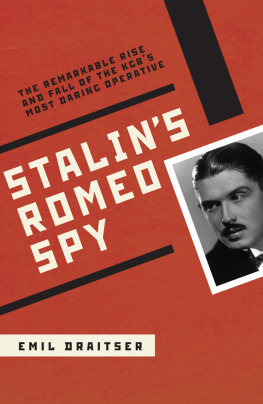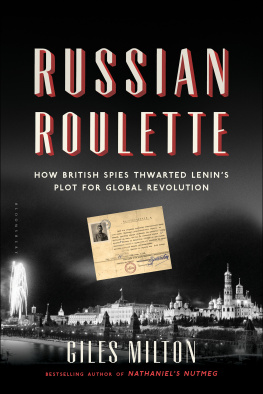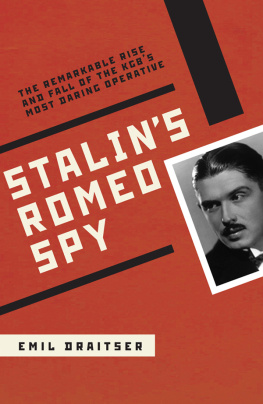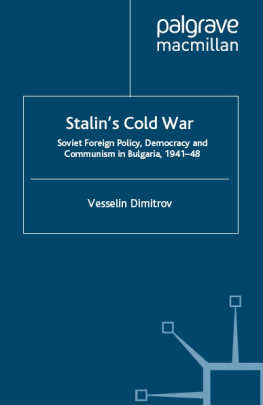STALINS ROMEO SPY
ALSO BY EMIL DRAITSER
Fiction
The Supervisor of the Sea and Other Stories
The Fun House (in Russian)
The Lost Boy and Other Stories (in Russian)
Wedding in Brighton Beach and Other Stories (in Polish)
Nonfiction
Shush! Growing Up Jewish Under Stalin: A Memoir
Making War, Not Love: Gender and Sexuality in Russian Humor
Taking Penguins to the Movies: Ethnic Humor in Russia
Techniques of Satire: The Case of Saltykov-Shchedrin
Who You Are: Autobiographical Notes (in Russian)
Nineteenth-Century Russian Poets: Anthology (in Russian)
Twentieth-Century Russian Poets: Anthology (in Russian)
Forbidden Laughter: Soviet Underground Jokes (bilingual Russian/English)

This eBook edition 2011
First published in the UK in 2011 by
Duckworth Overlook
90-93 Cowcross Street, London EC1M 6BF
Tel: 020 7490 7300
Fax: 020 7490 0080
info@duckworth-publishers.co.uk
www.ducknet.co.uk
Copyright 2010 by Emil Draitser.
Foreword copyright 2010 by Gary Kern
Published in the USA in 2010 by
Northwestern University Press.
Parts of this book previously appeared, in somewhat
different form, in the Journal of Intelligence History 6:2
(Winter 20067) and Gulag Studies 1 (2008).
All rights reserved. No part of this publication may be reproduced, stored in a retrieval system, or transmitted, in any form or by any means, electronic, mechanical, photocopying, recording or otherwise, without the prior permission of the publisher.
A catalogue record for this book is available
from the British Library
eISBNs
Mobipocket 978 0 7156 4315 0
ePub 978 0 7156 4314 3
PDF 978 0 7156 4313 6
To Jola,
whose patience and moral support
endured through years of this authors obsession
with a strangers life
Do you want to write your testimony in ink or in your own blood? The choice is yours.
KGB INTERROGATOR TO DMITRI BYSTROLYOTOV
Truth is stranger than fiction, but it is because fiction is obliged to stick to possibilities; truth isnt.
MARK TWAIN
He who controls the present, controls the past. He who controls the past, controls the future.
GEORGE ORWELL
FOREWORD
Gary Kern
Writers dont always choose their subjects; sometimes their subjects choose them. An idea comes to mind and takes hold of the imagination; the writer walks around talking to others and answering questions but thinking about the idea. He begins to imagine the way it could go, how it might develop. He might consider that he doesnt have time for it, and so he writes it down in his notebook in order to put it off. But one way or another it comes back. Did he choose it, or did it choose him? He begins to wonder. Ultimately he decides to go with it. He understands: it has grabbed him.
At other times its not an idea, but an experience or a person. The writer finds that some other person is interesting, that his story is worth telling, and just like the idea, so the image of this person begins to work on him. When he learns that this person has died and that his story has not been told or, even worse, has been told wrongly, then from out of nowhere he feels a responsibility. He can tell the true story, he can save the others soul, not in the religious sense, but in the sense of preserving something of his spirit, something of his suffering. And so he embarks on a research project to recover all the facts and figures about his subject, to piece together his broken and scattered biography, to look into his motives, and to try to understand his mind. Years go by. What is he doing? Working like a slave for his subject, a dead man, trying to bring him back to life, to consign his deeds to posterity. Its the same as with the idea: his hero has chosen him.
In his prologue to this fascinating book, Emil Draitser describes the time and place it happened: Moscow, September 11, 1973. He didnt realize its significance at the time but didnt forget the incident either. The man was curious, impressive, singular even, a former intelligence officer who had spent long years in the Gulag, but Draitser had pressing matters to attend to, such as getting out of the Soviet Union, establishing himself in a new country, making his career as a writer in a new language, surviving, and paying the bills. All the while he was developing the abilities that would enable him to take on the monumental task, in 2003, of recovering the biography of the man he had met, Dmitri Bystrolyotov. And it was good that he was delayed thirty years, because it was necessary for the Soviet Union to crumble, for archives to open, and for previously unpublished materials to come out, including the voluminous memoirs of Bystrolyotov himself. So many new materials were published in the 1990s, not only on Bystrolyotov, but on Soviet espionage in general, that only a native Russian like Draitser could have assimilated them in the six years he spent on the project. For a non-native it could easily have taken ten years or more.
But Draitser didnt stop with what was available. As he relates in the prologue, he flew to Moscow, Prague, and London and collected a body of publications, manuscripts, and documents such as no one else possesses, save the Russian State Securitythe KGB. Also, he sought out and interviewed a relative of Bystrolyotov who himself had already collected and preserved rare materials and who kindly furnished him copies. By the end of his project, he had becomelike every biographerthe one man in the world who could tell the complete story of his hero.
His quest perhaps would have seemed a private mania had the name Bystrolyotov not meanwhile emerged from obscurity and revealed its legendary status. Bystrolyotov was one of the Great Illegals, the first generation of Soviet spies who operated underground throughout Europe with the flair and success that earned them such a striking title. Even among them, he was outstanding, both for his feats of espionage in Europe, Africa, and America, and for his personal traits. He was a Romeo spy, handsome and dashing, with slick dark hair, a moustache, and a Greek or Hungarian name, who seduced secretaries and other women with access to government secrets; he recruited agents under a false flag, encouraging them to think that they were helping Japan or Germany when actually they were helping the Soviet Union. He destroyed peoples careers and lives wherever he went. His manipulation of a London code clerk and his wife was particularly sordid, and the end was messy. Yet, like some others of his clan, he was a sensitive and troubled man, with artistic and literary talents, humane aspirations, and selfless dedication to the Communist ideal.
He was, in short, a monstera cheat, seducer, and destroyer of other peoples lives for the glory of the Soviet state and the good of all mankind. The biographer of such a figure is confronted by more than one task. First, of course, he must establish the basic facts in the life and career of a spy, a man whose person and profession are clandestine and deceptive by nature. Even in his own writings, the spy may spin the story, not only minimizing his unheroic deeds or failing to recall entire episodes, but also embellishing his exploits. His idea of the truth is not the same as that of his biographer. Further, Bystrolyotov lived and died in the Soviet period, so everything he wrote and hoped to get published had to keep the censor in mind. Draitser, sifting through all these problems and gleaning the basic facts, has also to account for his heros actionsfor the fact that he became a monster. And here he is obliged to engage in psychoanalysis, finding a cold mother, who gave birth to an illegitimate son only as a form of feminist protest and then left the boy to suffer years of agonizing loneliness; the wounded boy becomes a Romeo spy but has a pathological relationship with his wife, a beautiful woman who conceals her sexual proclivities. Draitser has also to explain the historical and social context in which the spy operated: the Stalin period, the purges, the omnipresence of the Secret Police, the Leader, the Doctrine. He knows the period well, having spent his childhood and teenage years under Stalin. Naturally, he has to accomplish all these tasks not one after the other, but simultaneously.
Next page












